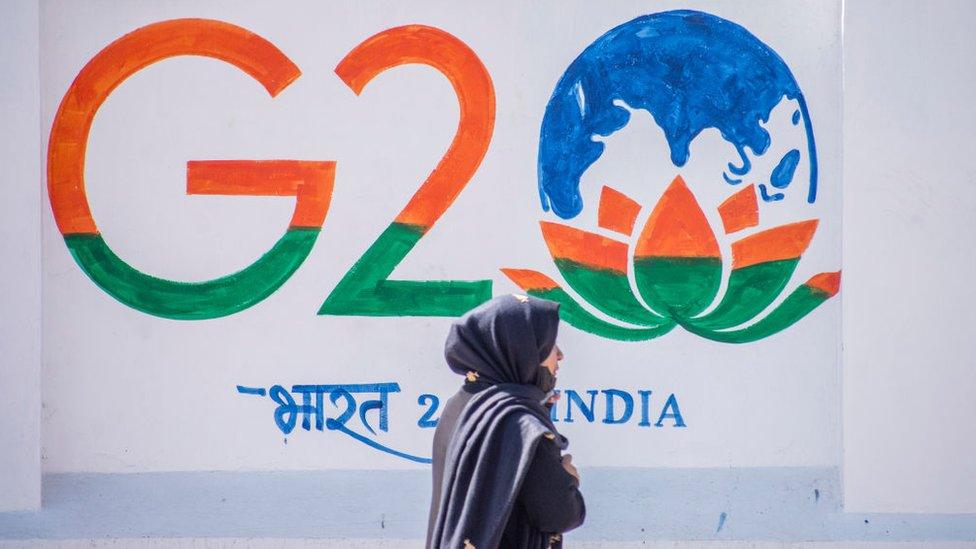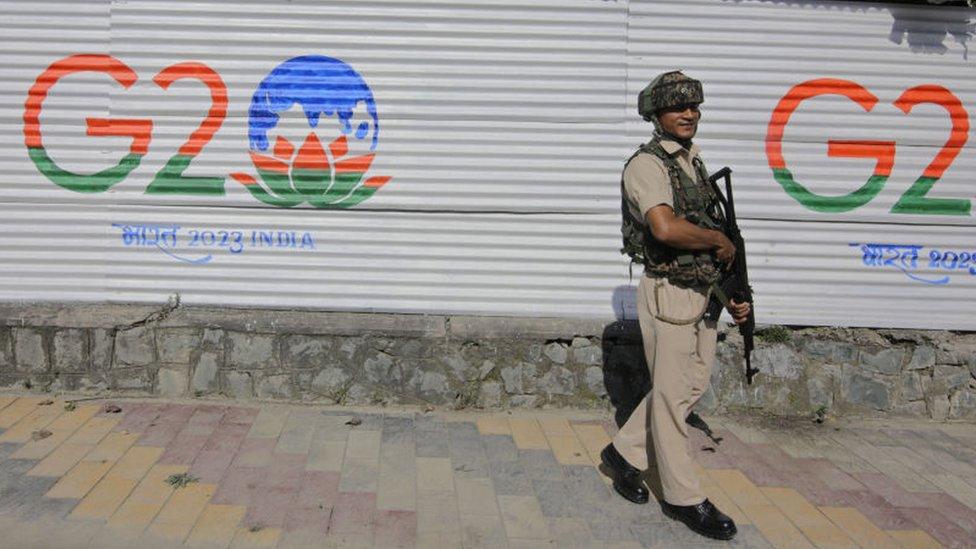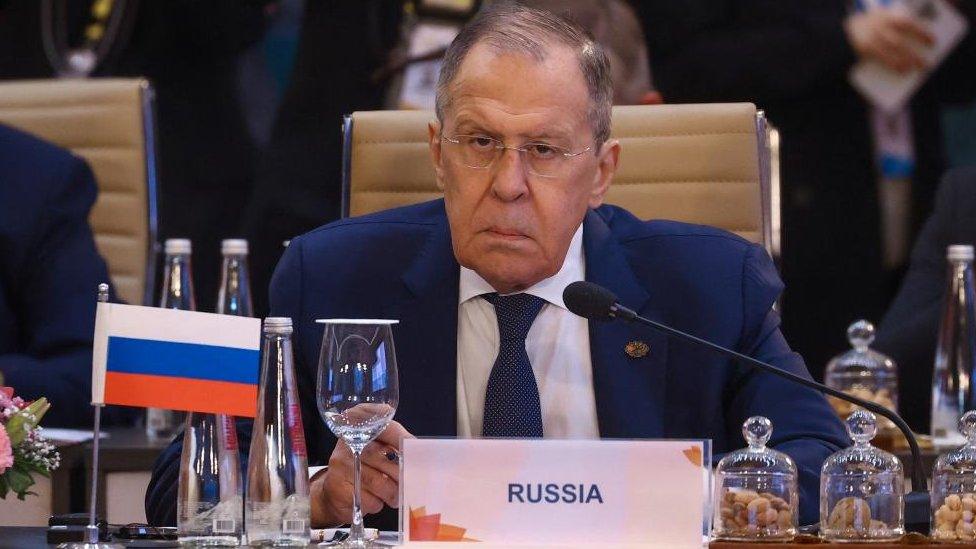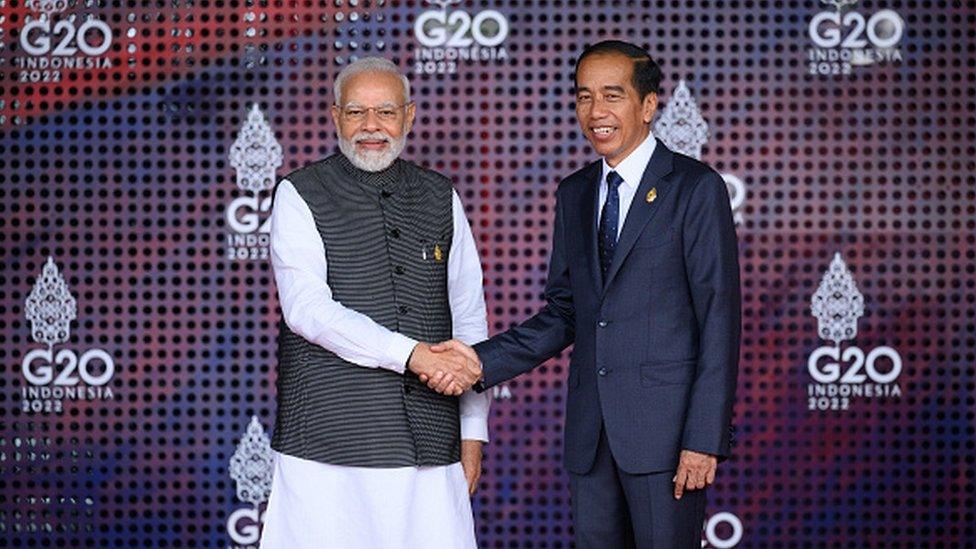G20: India hosts tourism meet in Kashmir amid tight security
- Published

India has stepped up security arrangements in Kashmir ahead of the meeting
India is holding a key G20 tourism meeting in Kashmir amid heightened security and opposition from China.
The working group meeting is being held in Srinagar, the summer capital of the federally administrated territory, from Monday to Wednesday.
This is the biggest international event organised in the region since India scrapped its special status in 2019.
Over 60 delegates from G20 member countries are expected to attend the event.
China, however, has said it will not attend, citing its firm opposition "to holding any kind of G20 meetings in disputed territory". The BBC has emailed India's foreign ministry for its response to China's statement.
Both India and Pakistan claim Kashmir in full, but control only parts of it. The nuclear-armed neighbours have already fought two wars and a limited conflict over the region.
In April, Pakistan, which is not a G20 member, had criticised India's decision to hold the meetings in Kashmir, calling it an "irresponsible" move.
India, however said, that it was "natural" to hold G20 events and meetings in "Jammu and Kashmir and Ladakh, which are an integral and inalienable part" of the country.
In 2019, the Bharatiya Janata Party-led federal government had divided the Muslim-majority state of Jammu and Kashmir to create two federally administrated territories - Jammu and Kashmir, and Ladakh. Ladakh is a disputed frontier region along the Line of Actual Control (LAC) between India and China, and both countries claim parts of it.
The Indian government and several sections of the media have calling the G20 event in Kashmir "historic", billing it as an opportunity to showcase the region's culture.
In the days leading up to the event, India had conducted several security drills in Kashmir. The region has seen an armed insurgency against India since 1989 - India accuses Pakistan of fomenting the unrest by backing separatist militants, a charge denied by Islamabad.
Over the decades, opposition politicians, activists and locals have also accused successive Indian governments of human rights violations and stifling of freedoms in the restive region - which Delhi has denied.

Some opposition leaders have criticised the elaborate security arrangements ahead of the G20 meet
This year, the region has witnessed increased attacks by suspected militants and security officers have told, external the media that they are taking steps to prevent any threats designed to derail the G20 meet.
Elite security forces - including marine commandos, National Security Guards, Border Security Force and police forces - have been deployed in Kashmir to provide ground-to-air security cover, according to reports.
Security has also been boosted around the Dal Lake and the Sher-e-Kashmir International Convention Centre (SKICC) in Srinagar, which is the venue for the meeting.
Schools around the routes that G20 delegates will use have been closed. Military bunkers, a common sight in Kashmir, have been covered with G20 banners to hide them from view.
Local opposition leaders, including former Jammu and Kashmir chief minister Mehbooba Mufti, have criticised the elaborate security arrangements and accused the federal government of making life even more difficult for ordinary people. In a press conference, Ms Mufti compared the restrictions in Kashmir ahead of G20 to that of the notorious US military prison, Guantanamo Bay. The Jammu and Kashmir administration has not responded to this yet.
A 53-year-old businessman, who did not want to be named, told the BBC that locals had to "face a lot of difficulties" over the past 10 days due to the security arrangements.
"There was a lot of frisking, checking and search operations in residential areas. Many schools and colleges are shut," he said.
He also questioned the federal government's claim that the meeting would boost the local economy, saying that only "permanent peace" could achieve that.
Others have also criticised the decision to hold the meeting in Kashmir.
Last week, Fernand de Varennes, the UN's special rapporteur on minority issues, had issued a statement saying that the G20 was "unwittingly providing a veneer of support to a facade of normalcy" when human rights violations, political persecution and illegal arrests were escalating in Kashmir. The statement was criticised by India's permanent mission at the UN on Twitter.
India has said it will showcase, external the cultural heritage of Kashmir and promote its tourism potential during the meeting. Delegates will be taken on sightseeing tours and there will be discussions on strategies to promote "film tourism", according to an official statement.
The G20, which includes the world's 19 wealthiest nations plus the European Union, accounts for 85% of global economic output and two-thirds of its population.
India currently holds the presidency - which rotates annually between members - and is set to host the G20 summit in Delhi in September.
BBC News India is now on YouTube. Click here, external to subscribe and watch our documentaries, explainers and features.

Read more India stories from the BBC:

- Published2 March 2023

- Published1 December 2022
